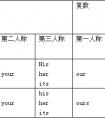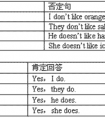Couldyouask him_______? I'm not good at English.[ ]A. to speak quicklyB. to speak slowlyC. to speak loudlyD. not to speak slowly-九年级英语
题文
| Could you ask him_______? I'm not good at English. |
| [ ] |
| A. to speak quickly B. to speak slowly C. to speak loudly D. not to speak slowly |
答案
| B |
据专家权威分析,试题“Couldyouask him_______? I'm not good at English.[ ]A. to..”主要考查你对 不定式,副词 等考点的理解。关于这些考点的“档案”如下:
不定式副词
考点名称:不定式
- 动词不定式:
指由to加上动词原形(而且只能是动词原形)所构成的一种非限定性动词,但在有些情况下to可以省略。
动词不定式在语法功能上可作主语、宾语、宾语补足语、表语、定语和状语。 - 动词不定式可以作以上各种成分,但它毕竟是动词,所以有动词的属性。
动词不定式及其短语还可以有自己的宾语、状语,虽然动词不定式在语法上没有表面上的直接主语,但它表达的意义是动作,这一动作一定由使动者发出。
这一使动者我们称之为逻辑主语,其形式如下:
时态 主动形式 被动形式 一般式 (not) to do (not) to be done 完成式 (not) to have done (not) to have been done 进行式 (not) to be doing 完成进行式 (not) to have been doing - 不定式的用法:
1、不定式作主语
例如:To remember this is very important.
注意:为了避免头重脚轻,在许多情况下,通常都将作主语的不定式置于句子后部,而在句首主语位置使用形式主语it。
例如:It is very important to remember this.
2、不定式作表语
例如:He seems to be ill.
注意:不定式作表语主要有三种情况,一是用于seem, appear, prove等系动词之后的不 定式(尤其是to be),
二是像My job is to sweep the floor. 这样的主语与表语“等价”的情形,
三是表示想法、约定、义务、命令、可能性、命运等,如:
You are to come when I call.
3、不定式作宾语
例如:I can not afford to buy a car.
注意:
①不定式不仅用作动词的宾语,还可用作个别介词(but, except)的宾语。
例如:I had no choice but to wait.
②当作宾语的不定式后跟有宾语补足语时,通常要用形式宾语it代替不定式,并将真正的宾语不定式置于宾语补足语之后
例如:I find it difficult to learn Japanese well.
4、不定式作宾语补足语
例如:Who taught you to drive?
5、不定式作定语
例如:I have a question to ask you.
注意:有的名词(如way, chance, right等)后用作不定式可换成of doing sth.
如:It is the best way to do (of doing) it.
但是以下名词后接不定式作定语时通常不能换成of doing sth.
attempt courage decision effort fortune failure invitation wish
6、不定式作状语
例如:I went to France to learn French.
考点名称:副词
- 副词:
是一种用来修饰动词、形容词、全句的词,说明时间、地点、程度、方式等概念的词。副词是一种半虚半实的词。
副词可分为:地点副词、方式副词、程度副词、疑问副词和连接副词。
副词连用顺序:程度副词+方式副词+地点副词+时间副词。 副词分类:
1、时间副词有三类:always, often, usually, sometimes, never, ever, hardly等一般位于系动词、情态动词和助动词之后,实之前义动词
1)表示发生时间的副词:
It’s beginning to rain now! 现在开始下雨了!
2)表示频繁程度的副词,也称频度副词always, often, usually, sometimes, never, ever, hardly等一般位于系动词、情态动词和助动词之后,实之前义动词:
She often changes her mind. 她常改变主意。
3)还有一些其他表示时间的副词:
He has just had an operation. 他刚动过手术。
2、地点副词:
1)有不少表示地点的副词:
She is studying abroad. 她在国外留学。
2)还有一些部分与介词同形的副词。它们与介词同形,跟宾语的是介词,否则是副词:
①用作介词:Stand up! 起立!
②用作副词:A cat climbed up the tree. 猫爬上了树。
3)以where 构成的副词也是地点副词:
It’s the same everywhere. 到处都一样。
3、方式副词:
carefully, properly(适当地), anxiously(焦虑地), suddenly, normally(正常地), fast, well, calmly(冷静地), politely(有礼貌地), proudly(自豪地), softly, warmly ,slowly
4、程度副词:
much,little, very,rather(相当),so,too,still, quite, perfectly(完美地), enough, extremely(非常), entirely(整个),almost, slightly(细小地), hardly.
5、疑问副词:
how, when, where, why.
6、关系副词:
when, where, why.等。
7、 连接副词:
therefore(因此),moreover(此外),however,otherwise(另外的),then,when ,where,how,why等。副词的语法作用:
副词在句中可作状语,表语,补语,定语。
He works hard. (作状语)
他工作努力。
You speak English very well. (作状语)
你英语讲的相当好。
Is she in ? (作表语)
她在家吗?
Let's be out. (作表语)
让我们出去吧。
Food here is hardly to get. (here作定语,hardly作状语)
这儿很难弄到食物。
Let him out!(作补语)
让他出去!
修饰名词的副词放在被修饰词之后
a. The villagers there are busy getting in wheat.不同类型副词的用法比较:
方式副词:
1)英语中有大量方式副词,说明行为方式(回答how的问题):
How beautifully your wife dances. 你夫人舞跳的真美。
2)还有相当多的副词,表示某些情绪:
She smiled gratefully. 她感激的笑了笑。
3)还有一些以-ly结尾的副词,表示动作发生的状况:
He left the town secretly. 他悄然离开了这座城市。
程度副词和强调副词 :
1)程度副词可修饰动词,表示“到某种程度”: Is she badly hurt? 她伤得重吗?
[说明] 这类副词除修饰动词外,还可修饰形容词(a)或另一副词(b):
a. fairly simple 相当简单 quite correct 完全正确
b. wonderfully well 好极了 do it very quickly 干得很快
2)much 是一个特殊的程度副词,它可以:
a. 修饰形容词等:
I’m not much good at singing. 我唱歌不太好。
b. 修饰比较级:
You sing much better than me. 你比我唱的好多了。
Their house is much nicer than ours. 他们的房子比我们的好多了。
疑问副词和连接副词:
1)疑问副词:疑问副词用来引导特殊问句:
how: How is your grandmother? 你奶奶身体好吗?
where: Where does she come from? 她是哪儿人?
when: When can you come? 你什么时候能来?
why: Why was he so late? 他为什么来得这么晚?
- 最新内容
- 相关内容
- 网友推荐
- 图文推荐
| [家长教育] 孩子为什么会和父母感情疏离? (2019-07-14) |
| [教师分享] 给远方姐姐的一封信 (2018-11-07) |
| [教师分享] 伸缩门 (2018-11-07) |
| [教师分享] 回家乡 (2018-11-07) |
| [教师分享] 是风味也是人间 (2018-11-07) |
| [教师分享] 一句格言的启示 (2018-11-07) |
| [教师分享] 无规矩不成方圆 (2018-11-07) |
| [教师分享] 第十届全国教育名家论坛有感(二) (2018-11-07) |
| [教师分享] 贪玩的小狗 (2018-11-07) |
| [教师分享] 未命名文章 (2018-11-07) |


![Sunday is my birthday. I would like _____ a birthday party, would you _____to my party? [ ]A. have; come B. to have; to come C. have; to come D. to have-七年级英语](http://www.00-edu.com/d/file/ks/4/2/budingshi/2020-01-08/smalla85122db0c71d7fb6ae58187be7f1fd11578430330.png)

![Why areyou here? You are supposed ______ in the classroom now. [ ] A. to studyB. to be studiedC. studying D. to be studying -九年级英语](http://www.00-edu.com/d/file/ks/4/2/budingshi/2020-01-08/small6dee02daa62cac1c71853ac804ab4fbd1578422460.png)
![She is very poor. Little food _____ and no room _____! [ ]A. to eat, to live B. to eat, to live in C. eating, living -八年级英语](http://www.00-edu.com/d/file/ks/4/2/budingshi/2020-01-09/small17b77c2697a3ef8f1461d0d14b016ee51578585185.png)
